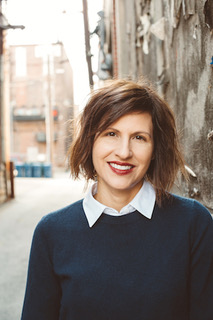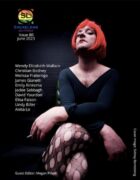The essay ends with your confession to the optometrist that “everything is blurry,” which works so beautifully as a metaphor for the limits of both memory and observation. How do imagination and speculation inform your approach to memoir writing?
Thank you! I really loved how everything came together in that final section. This piece, due to its brevity, forced me through several revisions where I literally had to “re-see” every moment in great detail. I found that with each return in my mind, I noticed something—the sight of the kapusta bubbling on the stovetop, the image of my daughters and their cousins stitching clothes for Ratty—so I began with memory and observation and moved slowly through multiple turns on the page. Only then was I able to consider what else is here? That is when the speculation came in. It arrived from a deeper, less conscious place. In this instance, I returned to a time and place that was already in my past and yet felt like the beginning of an end. I didn’t want to explore this in an intentional way—but I could through my imagination.
The writer Arthur Frank talks about the importance of the literature of witnessing and the complexity of writing about a loved one’s illness. The essay contains an important recognition (“something unknown to me until now”) during an especially vulnerable moment for your father. What advice would you give to other essayists writing about these important and intimate experiences?
Oof. First, I can’t say that I’ll be sharing this piece with family. It’s pulling the curtain back on something intimate—something that I didn’t want to see and yet, who wants to see their loved ones grow frail? Who wants to consider our own mortality? And so, I did what I’ve always done: I wrote about that Easter celebration and I gave myself the freedom in that moment to try and make sense of something that frightened me. The advice I can offer is to give yourself the same grace. Let yourself be present on the page. There is no one else in the room but you and your memory and the words that allow you to move beyond the event or heartache to something unknowable. Second, you have to find a way to take care of yourself during the process. That might sound a little corny, but when you go into those dark corners, the rest of life is still taking place around you and when you do come out, you are often changed—ever so slightly. Sometimes that change haunts you for the rest of the day or more and it’s not like anyone around you understands the headspace you’ve resided the past three hours, so you have to find a way to navigate this weird space as you discover what it is you need to know about this experience with a loved one.
You include several details that build a strong presence of the culture of place: the altar of St. Ann’s, Dad’s rifles in the padded case, kapusta, US-41, painted signs for Trump 2024. Do these details emerge as you’re first drafting, or are these specifics you’re mindful of and intentional about as you shape an essay?
I appreciate you noticing the details I’ve included in the essay! I have a fondness for details as both a reader and a writer and attempt in subsequent drafts to pick the most relevant details, the ones that say a great deal with a few words. I find that details do make their way to the page with the initial draft, but then as I am trying to hone the theme or tone, I’ll look for what details might best convey this intent. Even now I can very clearly see those painted signs for Trump 2024—they are outside a nondescript ranch on US-41 and on that day, the signs were newly painted and while there was hope and optimism around my dad, there was also this looming sense of dread that mirrored the political climate in Northwest Indiana. Plus, you can see those signs, right? I want my reader to be right there.
Who are your most important influences as a writer, and do you recognize any particular influence in the writing of “Under-prescribed?”
I belong to a fabulous writer’s group and I don’t know that “Under-prescribed” would be what it is today without their generous and kind words. The first draft was a bloated thirteen hundred and spent way too much time “winding up” to the day—setting the scene with family and their dogs (there were more with the dogs in the earlier version), but my writing group was drawn to the voice that presents itself (at the time) about half-way through the piece, when the narrator is at the table and the food doesn’t taste that good and then she sees her dad cleaning up after the dog and notices the wet spot on his jeans. I found it really helpful to hear how they were moved by the voice in that moment, and this encouraged me to go back and see if I could use such a strategy throughout. A flash by Fielding Dawson called “The Vertical Fields” inspired me to limit punctuation and lean into longer sentences to better mirror this moment with all of its impending fears.



 The core workshop of SmokeLong Fitness is all in writing, so you can take part from anywhere at anytime. We are excited about creating a supportive, consistent and structured environment for flash writers to work on their craft in a community. We are thrilled and proud to say that our workshop participants have won, placed, or been listed in every major flash competition. Community works.
The core workshop of SmokeLong Fitness is all in writing, so you can take part from anywhere at anytime. We are excited about creating a supportive, consistent and structured environment for flash writers to work on their craft in a community. We are thrilled and proud to say that our workshop participants have won, placed, or been listed in every major flash competition. Community works.